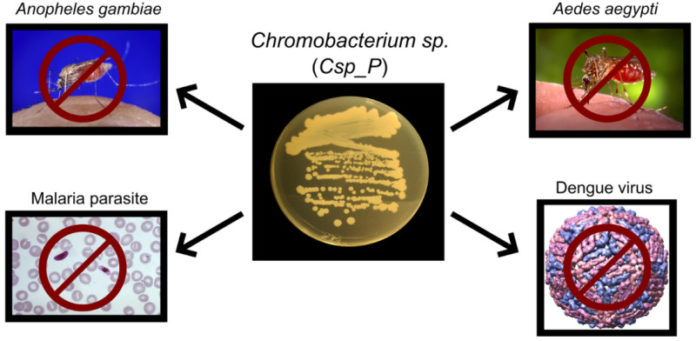
Just like those of humans, insect guts are full of microbes, and the microbiota can influence the insect’s ability to transmit diseases. A study published on October 23rd in PLOS Pathogens reports that a bacterium isolated from the gut of an Aedes mosquito can reduce infection of mosquitoes by malaria parasites and dengue virus. The bacterium can also directly inhibit these pathogens in the test tube, and shorten the life span of the mosquitoes that transmit both diseases.
George Dimopoulos and colleagues from Johns Hopkins University, USA, had previously isolated Csp_P, a member of the family of chromobacteria, from the gut of Aedes aegypti mosquitoes (which transmit dengue fever) in Panama. In the present study, they examined its actions on both mosquitoes and pathogens, and the results suggest that Csp_P might help to fight malaria and dengue fever at different levels.
The researchers added Csp_P to sugar water fed to mosquitoes and found that the bacteria are able to quickly colonize the gut of the two most important mosquito disease vectors, namely Aedes aegypti and Anopheles gambiae (the latter transmit malaria). Moreover, the presence of Csp_P in the gut reduced the susceptibility of the respective mosquitoes to infection with the malaria parasite Plasmodium falciparum or with dengue virus. And even without gut colonization, exposure to Csp_P through food or breeding water shortened the lifespan of adult mosquitoes and mosquito larvae of both species.
When the researchers tested whether Csp_P could act against the malaria or dengue pathogens directly, they found that the bacterium, likely through production of toxic metabolites, can inhibit growth of Plasmodium at various stages during the parasite’s life cycle, and also abolish dengue virus infectivity. In addition, Csp_P can inhibit growth of many other bacteria.
The authors suggest that these toxic metabolites could potentially be developed into therapeutic drugs for malaria and dengue. Overall, they conclude that “its broad-spectrum anti-pathogen properties together with its ability to kill mosquitoes make Csp_P a particularly interesting candidate for the development of novel control strategies for the two most important vector-borne diseases, and they therefore warrant further in-depth study.”
Story Source:
The above story is based on materials provided by PLOS. Note: Materials may be edited for content and length.
Journal Reference:
- Jose Luis Ramirez, Sarah M. Short, Ana C. Bahia, Raul G. Saraiva, Yuemei Dong, Seokyoung Kang, Abhai Tripathi, Godfree Mlambo, George Dimopoulos. Chromobacterium Csp_P Reduces Malaria and Dengue Infection in Vector Mosquitoes and Has Entomopathogenic and In Vitro Anti-pathogen Activities. Plos Pathogens, October 23, 2014 DOI: 10.1371/journal.ppat.1004398
